Admiral Horatio Nelson and his ‘Dearest only true friend’
This week we present two letters from Admiral Horatio Lord Nelson (1758-1805), generally regarded as the greatest officer in the history of the Royal Navy. The letters are highlights of the Marseille Middleton Holloway collection, recently entrusted to the University
One of Britain’s most heroic figures, Horatio Nelson’s inspirational, strategic and – at times – unconventional leadership led him to secure many high-profile naval victories at the turn of the 19th century. Nelson was born in Burnham Thorpe in Norfolk and was encouraged to join the navy by his uncle, Maurice Suckling. When Britain entered the French Revolutionary Wars in 1793, Nelson was given command of the Agamemnon. He served in the Mediterranean, helped capture Corsica and saw battle at Calvi (where he lost the sight in his right eye). He returned to service the following year to win a decisive victory over the French at the Battle of the Nile.
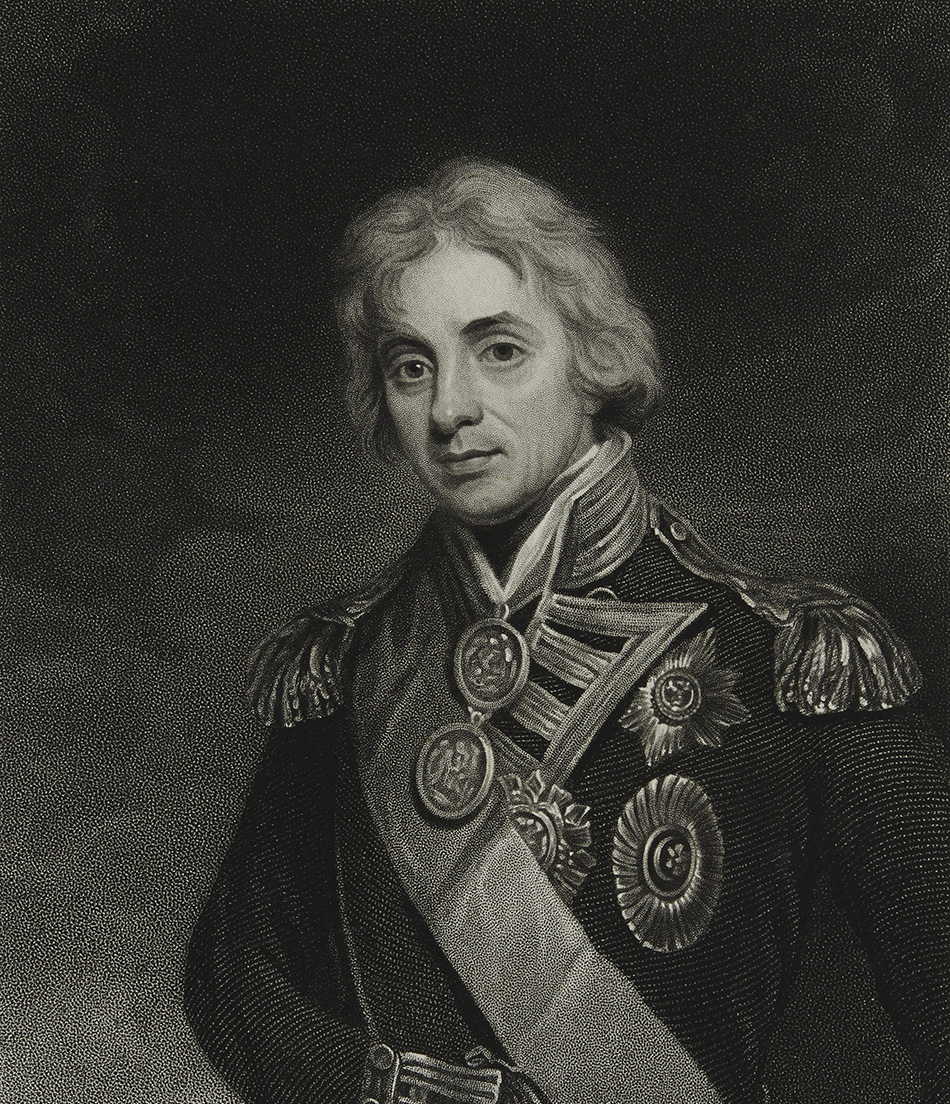
One letter is written using his right hand, from on board HMS Agamemnon on 12 March 1795, two days before the Battle of Genoa. The battle was part of an effort to prevent the French from retaking Corsica, which the British had captured the year before. It was the first major naval engagement for then-Captain Nelson, who helped take a large French warship out of the fight – the Ça Ira, an 80-gun ship of the line nearly twice the size of Nelson’s HMS Agamemnon.
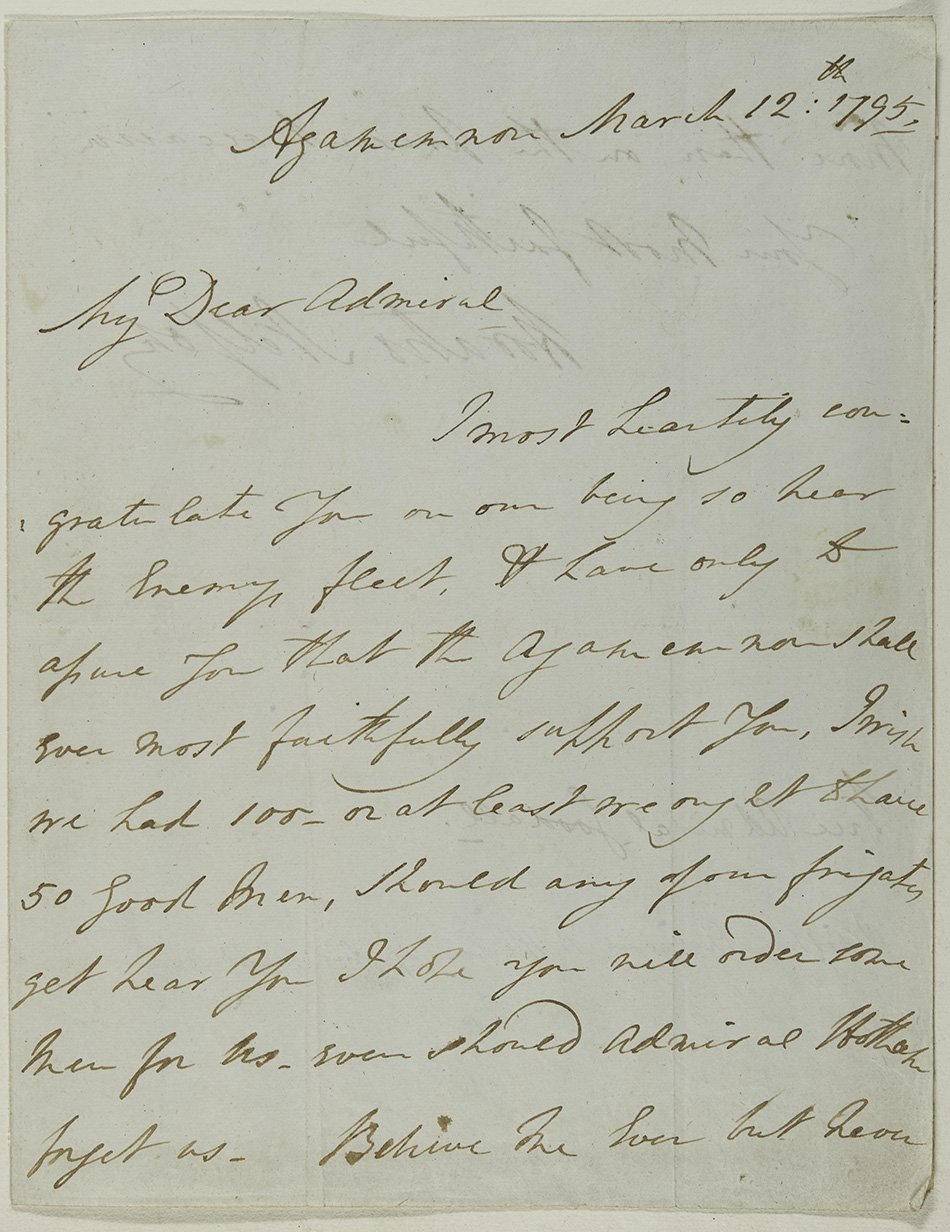
Agamemnon March 12th: 1795.
My Dear Admiral
I most heartily con=
gratulate You on our being so near
to the Enemy fleet, & have only to
assure you that the Agamemnon shall
ever most faithfully support You. I wish
we had 100- or at least we ought to have
50 good Men, Should any of our frigates
get near You I hope you will order some
Men for us, even should Admiral Hotham
forget us. Believe me Ever but Never
more than on the present occasion
Your Most faithful
Horatio NelsonVice Admiral Goodall.
The other letter dates from 8 May 1801 and is written using his left hand as Nelson had lost his right arm in the Battle of Santa Cruz de Tenerife on 27 July 1797. Nelson writes in the aftermath of the Battle of Copenhagen on 2 April 1801 in which he led the British fleet in an attack on the Danish fleet. Under the command of Admiral Sir Hyde Parker, Nelson defied orders to withdraw by holding a telescope up to his blind eye and claiming he could not see Parker’s signal. Nelson agreed a truce with the Danes and was rewarded on his return to England by being created Viscount Nelson of the Nile.
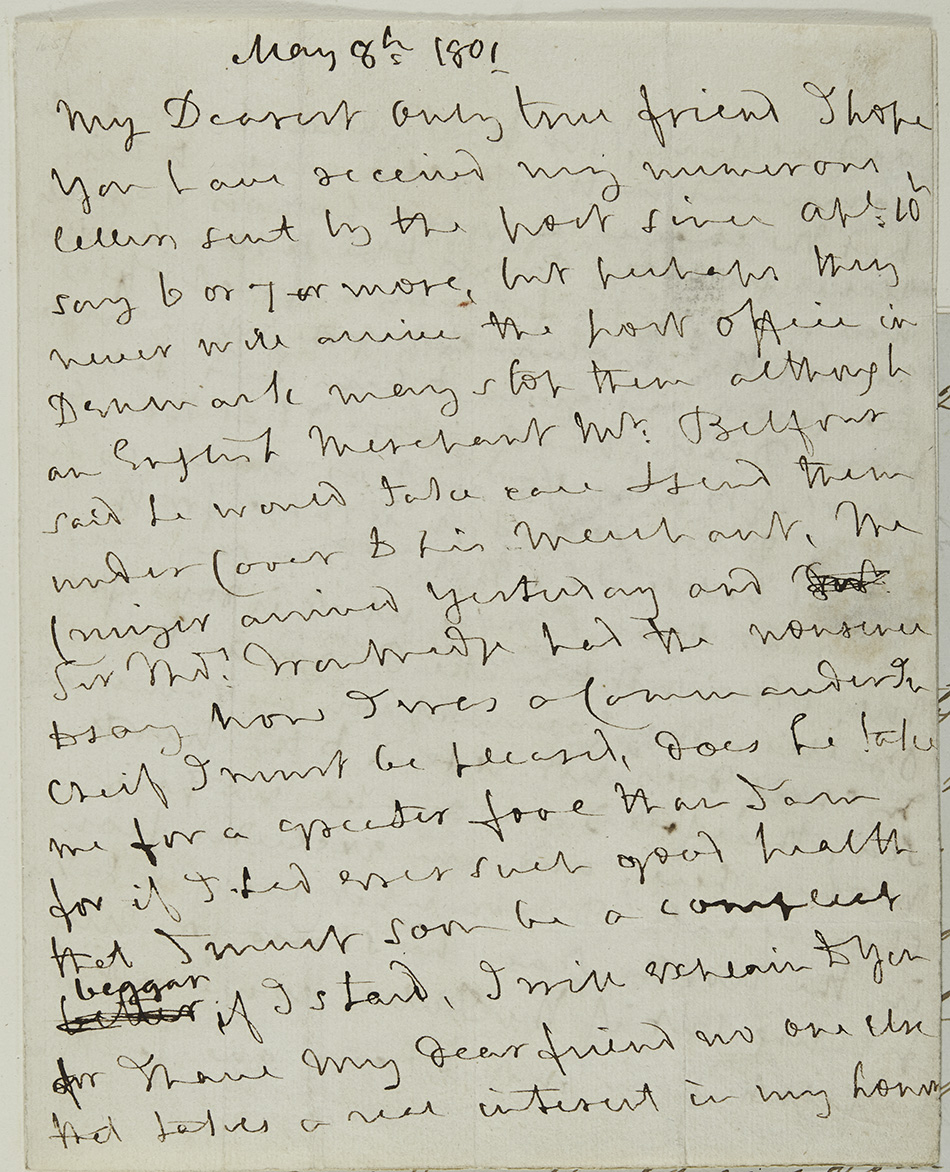
May 8th 1801
My Dearest only true friend I hope
you have received my numerous
letters sent by the post since Ap[ri]l 10th
say 6 or 7 or more, but perhaps they
never will arrive the post office in
Denmark may stop them although
an English Merchant Mr. Belfort
said he would take care & send them
under Cover to his Merchant. The
Cruizer arrived yesterday and Sir
Sir Tho[ma]s Troubridge had the nonsense
to say now I was a Commander In
Cheif I must be pleased, does he take
me for a greater fool than I am
for if I had ever such good health
that I must soon be a compleat
better beggar if I stand, I will explain to you
for I have my dear friend no one else
that takes a real interest in my honor
and welfare, Sir H[yde]. P[arke]r: when he had the
command in the Baltic given to him
had the chance of great honors & great
riches from the Prizes to be taken, but that
was not enough for such a great officer
he had the emolument of the whole North
Sea Command given to him and taken
from Dixon and of course I had then the
honor of sharing 1/5 part as much as Sir
H[yde].P[arke]r. Dixon Foley etc will share for the
Danish battle, & Sir H…. I dare say will
get bear 5000 £ now what is done for
my Orders not to make Prizes in the
Baltic, My Commission as Commander
in Chief does not extend to the north
Sea, therefore I can make no prize
money here, and am excluded from
sharing with Dixon what may be taken
in the North Seas, he shares for my
fighting but if the Dutch come out &
he fights I am not to have one farthing
I have now all the expences of a
Commander In Chief and am strippd
even of the little chance of prize Money
which I might have had by being
in a Subrodinate situation, this
is the honor, this is my reward
a prison for debt, I see no other pros-
spect (but I know your generous heart
does not care
whether I am
rich or poor
I have wrote very
strongly by the arrow
which left us your great &
glorious birth day, I wrote by
Sir Hyde desiring they would send out another
Commander In Chief & I have wrote it again
this day, why should I die to do what please
those who care not a Damn about Me
I will try & bear up & return but it
wearies my poor heart, my conduct is
surely diff[eren]t or I know not myself, for
ever for ever your truly affectionate
Nelson & Bronte
The recipient of this letter is Lady Emma Hamilton (c. 1765-1815) whom Nelson had first met in 1798 while recuperating at the home she shared with her husband Sir William Hamilton, British Ambassador to the Kingdom of Naples. Emma Hamilton soon became Nelson’s mistress. Nelson’s affair with Hamilton was one of the biggest public scandals of the time. They met in 1793 when he was a 35-year-old married captain and she was 28, the wife of Sir William Hamilton, a diplomat. Emma, Nelson and Sir William returned to England together in 1800. Nelson returned to active service in January 1801, which meant that the lovers were apart when Emma gave birth to his daughter, whom they named Horatia. To avoid prying eyes, he wrote to her pretending his letters were on behalf of a seaman under his command called Thompson, whose pregnant wife was under Emma’s protection.
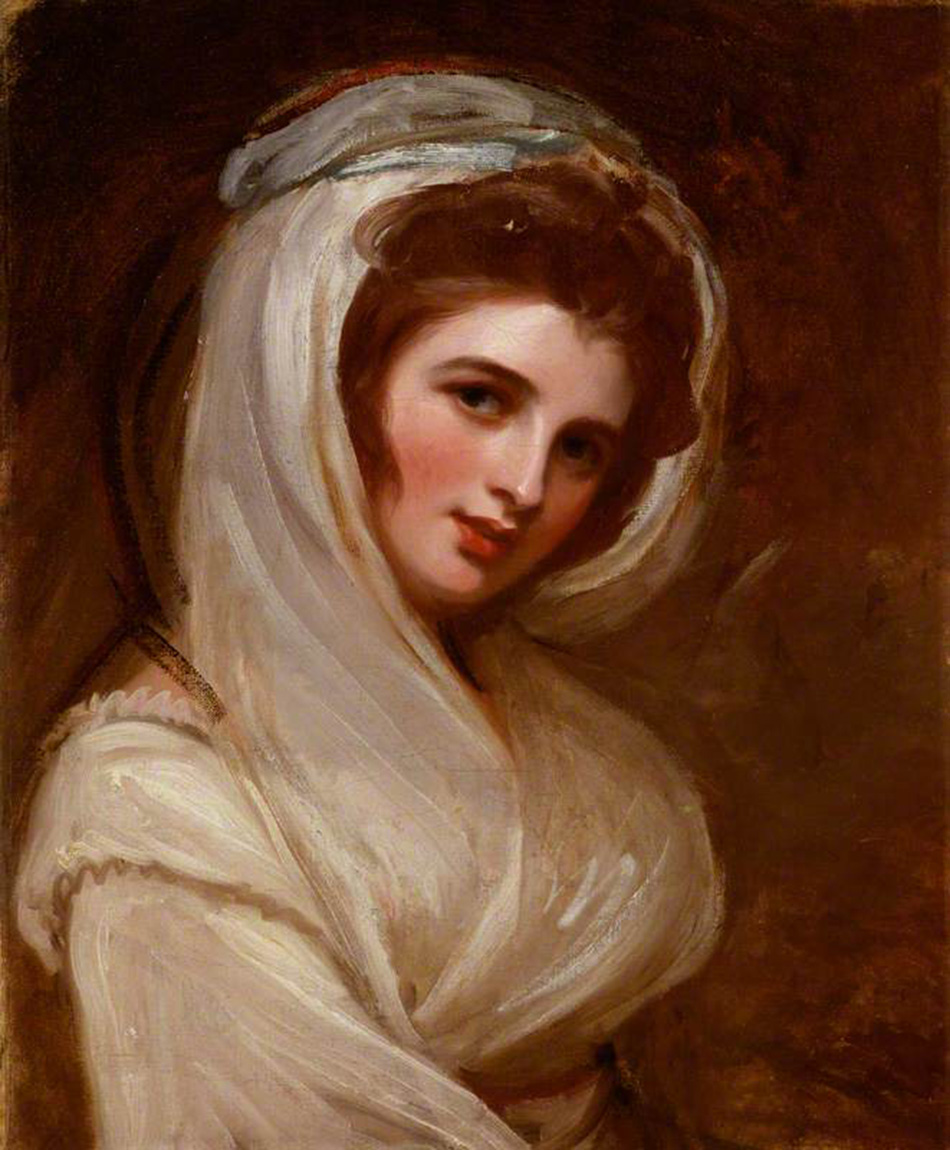
In the letter to Lady Emma Hamilton Nelson complains about impact of his orders not to take prizes in the Baltic, but he remains secure in the love of Emma, his ‘Dearest only true friend’. Lady Hamilton remained with Lord Nelson following the death of her husband in 1803, but ended her life in poverty after he was killed at the Battle of Trafalgar two years later.
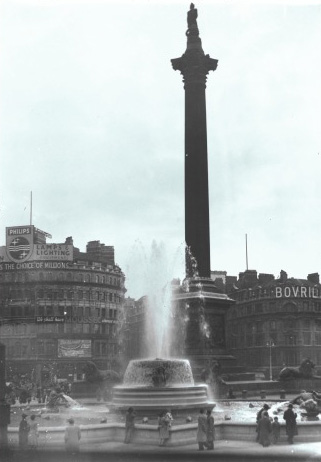
Gabriel Sewell
Assistant Director of Library Services (Special Collections)
A wonderful post on the life and love of Lord Nelson! I wish I had known of his ship's name (HMS Agamemnon) prior to commanding the Victory - another great parallel I might have mentioned in my latest post: Thetis Delivered Achilles' Shield to... Lord Nelson at Trafalgar? https://theshieldofachilles.net/2018/05/01/thetis-delivered-achilles-shield-to-lord-nelson-at-trafalgar/